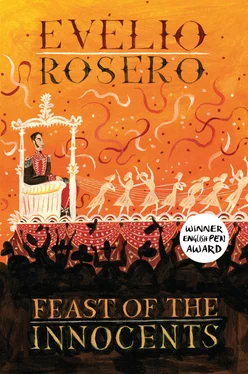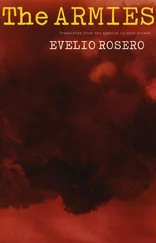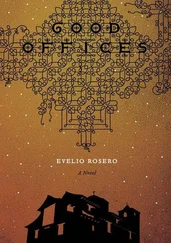“Governor Cántaro and General Aipe will waste no time in taking measures,” Matías Serrano was arguing. “They’re not going to let Simón Bolívar dance to your tune, Justo Pastor, especially not up on a carnival float. It’d be different in a book: nobody reads books; on a public float there’s a name for this: disrespect towards the founding father, and that, as far as those animals are concerned, is worse than insulting the flag, coat of arms and national anthem all at once, three distinct entities in a single true God. It’ll be wretched. They’ll have the whole weight of the law on their side to smash your float, imprison you, if you insist, and give you a few warning wallops.”
“That’s if they don’t mangle your fingers, like happened to that Vicente Azuero, who published articles against Bolívar’s dictatorship in his newspaper. A colonel by the name of Bolívar, perhaps another grateful descendent, sought him out and smashed the fingers he’d written his truths with. It was a straightforward threat: break the fingers of anyone who writes against Bolívar. I’ve suffered similar experiences myself, and I can describe them, if asked.”
It was Professor Arcaín Chivo who had spoken.
He was the first to arrive, breathless in the cold: he made his journey on foot, to save the taxi fare from his house, which was on the other side of town — behind Canchala church, where they worshipped the Lord of the Good Death. He’d come all that way, and there he stood, perspiring, with arms outstretched, when Doctor Proceso opened the door. It was exactly seven o’clock in the evening.
“My dearest Justo Pastor,” Chivo began, still with his arms spread wide like a crucifix, but without taking a step forward, without yet coming in for the clinch, by which Doctor Proceso understood that he must wait for the professor’s salutation, a greeting possibly rehearsed in advance.
“The only redeeming feature of old age is that one ages alongside one’s friends,” Chivo said, jubilantly.
Tall but stooping, he had the bloodshot eyes of a hardened drinker, bushy grey hair and a leathery, yellow face. He held back a few more seconds before concluding:
“To each of us comes the same slice of sorrow, or ugliness, that the years bring with them, isn’t that right, my dear Doctor Justo Pastor Proceso López, you hermit crab, sage in solitude, one more of Pasto’s shades?”
“Must I thank you for this greeting?” the doctor asked, still without embracing the professor. “I just hope that your communal old age, with sorrow and ugliness to boot, will be a bit happier tonight, in my house.”
And they embraced.
They clapped each another heartily on the back, still inspecting one another; laughingly, they said they were going to give death the brush-off.
“Each passing year brings us closer to death, it’s true, but also closer to God,” came a sudden voice of ecclesiastical solemnity. It was the Wasp, or the Bishop of Pasto, who was in the habit of popping up like a wraith, unexpectedly. Neither the doctor nor the professor had noticed the long black Ford parking; the driver opened the door, promised to wait for His Excellency without moving from the spot, but neither the doctor nor the professor heard him, and they did not see the bishop either — who, what’s more, was not wearing the characteristic vestments of his office, just a black cassock with a small cross at the collar. Had he heard them, or did he speak of death and the passing years by chance? Hard to say: the three of them had their little tricks and their little ways, they were childhood friends, they had been through primary education together at the same school, San Francisco Javier.
And just then the Mayor of Pasto — another one from the same school — arrived, with more pomp than his predecessors: he was guarded by a policeman on a motorbike. He got out of the official car, spotted the three of them and hailed them at the top of his voice:
“By God, Bolívar is on trial today.”
By which Doctor Proceso understood once and for all that Bolívar’s carriage was common knowledge, or at least known about by the authorities.
“Let it be in God’s hands and the Devil’s,” he said quietly, but not so quietly that the bishop did not hear him.
“What’s that, Justo Pastor?”
“Let’s go inside at once, señores. Pasto is cold.”
In the living room, when all they had done was exchange those few warning words about the Bolívar float, Primavera Pinzón appeared before the learned invited friends, appeared, because you had to appear — he thought, gazing at her as if for the first time — my wife, he thought, you had to appear when I least needed you, showing up as if absolutely nothing had happened between the two of us (no scalpel, no tongue of any General Aipe), waltzing in, what’s more, as if the Bishop of Pasto were not among them; her appearance dazzled them, her blonde hair in two plaits, hands on hips, her hatred and vengeance well concealed — the doctor thought — Primavera Pinzón appeared wearing her costume for the Pasto carnival, and said:
“I was just trying on my ñapanga costume, señores , which will have its debut on the sixth of January. What do you think?”
And she gave a twirl.
Like a flame, thought Arcaín Chivo, recovering from the surprise. He was the first to approve.
“And God created woman,” he said, “the only thing in the world capable of coming between two brothers.”
“Or two peoples,” noted mayor Matías Serrano, “if we look to the Iliad .”
The professor ignored the reference. He had said what he said after taking a gulp of air, and without knowing whether it was appropriate to say it. He pulled himself together:
“It’s been ages, Primavera, since you’ve graced us with the pleasure of your company. That costume does wonders for you, but you do far more for it.”
“It’ll be a controversial costume,” the mayor said. “The ñapanga , the traditional dress of the Nariño countrywoman, comes down somewhat further below the knees.”
“This has been the year of the miniskirt,” Primavera reminded them. “At last they invented the miniskirt for us, señores .”
“Glorious invention by men for men,” Arcaín Chivo said. “Marvellous gift.” And bowing his head slightly in the bishop’s direction, he added: “Begging the pardon of those present.”
“There’s no need to beg the pardon of anyone present,” the Bishop of Pasto seemed benignly put out. “The discussion is worthy of interest. One might just ask oneself whether a real ñapanga , our countrywoman, would ever adopt this last word in fashion: the miniskirt.”
“Usurper of men’s peace,” the professor added quickly.
“I don’t think she would,” the bishop answered himself, ignoring the professor. “The Vatican has already expressed its disapproval — yes, allow me to continue, Arcaín — these days nobody cares about the Pope’s disapproval — you’re a living example of that — but it’s a matter of the Pope’s reflection, which we should consider from time to time, as Christians.”
“No ñapanga would wear a skirt that short,” the mayor said. “You’re taking a risk, Primavera: I read in the newspaper that a man was arrested for biting the thighs of a woman in a miniskirt; he claimed to the judges that she had provoked him.”
“A flimsy excuse,” Arcaín Chivo said. “It is provocative, but that doesn’t give us the right to go so far as to bite.”
“Quite so,” the mayor said. “We should ask permission first.”
“Not even if they do ask my permission, señores .” Primavera smiled fleetingly. “My thighs are not flesh for anyone’s nibbles.”
Читать дальше












